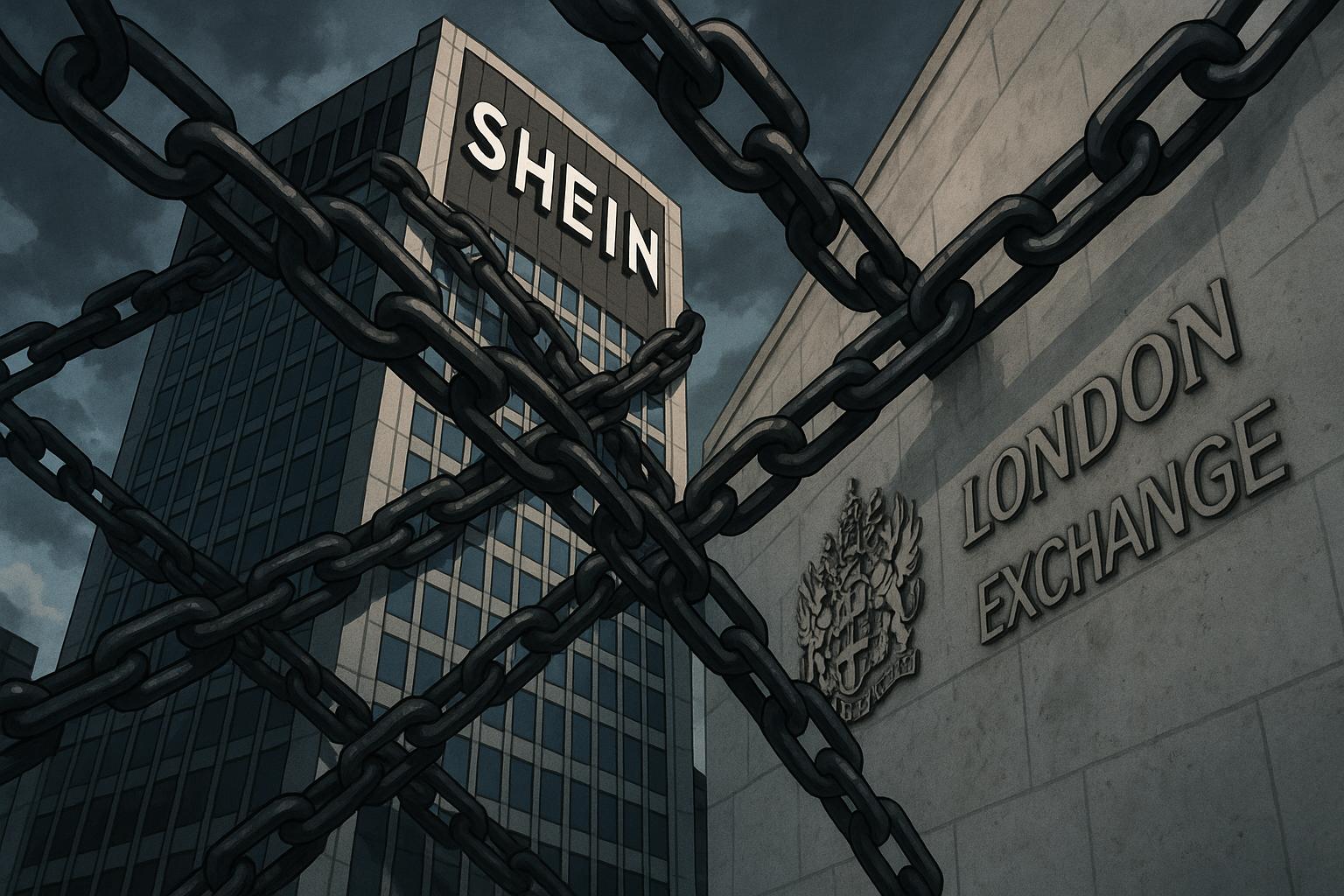Shein’s plans for a London Stock Exchange listing have ended following intense scrutiny over its supply chain integrity and links to alleged forced labour in Xinjiang, with political and investor backlash prompting the company to consider a Hong Kong float instead.
The ambitious plans for Shein, a Chinese fast fashion giant, to list on the London Stock Exchange have effectively come to an end, highlighting the complexities and controversies surrounding international business dealings, especially in relation to human rights. The company’s listing aspirations faltered after significant scrutiny from various stakeholders, including British MPs, who expressed serious reservations regarding the integrity of Shein’s supply chains.
During a meeting with Parliament’s business and trade select committee, Shein’s general counsel, Yinan Zhu, faced pointed criticism from Labour chairman Liam Byrne. Byrne articulated discontent with the company’s transparency, noting, “You’ve given us zero confidence in the integrity of your supply chains.” This lack of credibility is inextricably linked to allegations that some of Shein’s cotton garments are sourced from Xinjiang, a region where the Uyghur minority faces documented human rights abuses. As accusations of forced labour proliferate, the company’s claims of adherence to ethical standards have not quelled concerns among institutional investors, many of whom are increasingly committed to environmental, social, and governance (ESG) criteria.
The implications of a Shein IPO extend beyond market potential to encompass broader geopolitical tensions. Legislative measures targeting Chinese imports in the EU, alongside US tariffs, further complicate Shein’s proposed operations in Western markets. Many British fund managers have voiced anxiety over Shein’s alleged connections to forced labour, which casts a long shadow over the potential financial benefits of hosting such a high-profile listing. While there are those who argue that attracting companies like Shein to the UK might invigorate the London financial market, detractors caution that such listings could risk reputational damage.
Compounding these challenges is the reaction from human rights advocacy groups, which have rallied against Shein’s proposed listing. The UK-based organisation Stop Uyghur Genocide has called upon the Financial Conduct Authority (FCA) to intervene, framing the potential IPO as a serious violation of international obligations concerning labour rights. This sentiment echoes across the Atlantic, where US Senator Marco Rubio has pressed the UK government to investigate the company further, given its troubling history with allegations regarding forced labour.
Ultimately, the culmination of these factors has shifted focus away from London as a viable listing destination for Shein. Instead, the company is now reportedly contemplating a Hong Kong float, where regulatory oversight may be less daunting. This shift not only underscores the increasing challenges firms face when navigating Western regulatory environments but also signifies a retreat from commitments made by the UK government to bolster its financial sector post-Brexit.
As discussions surrounding Shein demonstrate, the intricate web of global supply chains and international relations continues to pose difficult questions for businesses attempting to balance profitability with ethical accountability. The failed attempt at a London listing serves as a critical reminder that the intersection of trade, politics, and ethics remains fraught with complexities that can have far-reaching consequences for global commerce and human rights advocacy.
Reference Map:
- Paragraph 1 – [1], [2]
- Paragraph 2 – [2], [3], [4]
- Paragraph 3 – [5], [6]
- Paragraph 4 – [7]
- Paragraph 5 – [1], [5]
Source: Noah Wire Services
- https://www.dailymail.co.uk/money/comment/article-14758497/No-silk-road-Shein-float-Labours-big-kowtow-Beijing-failed-says-ALEX-BRUMMER.html?ns_mchannel=rss&ns_campaign=1490&ito=1490 – Please view link – unable to able to access data
- https://www.ft.com/content/8bf1bb4d-2080-4ae3-87a9-c39408b1e851 – British fund managers have expressed concerns about Shein’s potential IPO in London, citing anxieties over the company’s alleged use of forced labour. Shein, valued at $66 billion, aims to list on the London Stock Exchange, presenting an opportunity for the City to host a large initial public offering. However, top UK institutional investors have highlighted the controversy over Shein’s alleged use of forced labour in its Xinjiang cotton supply chain as a significant deterrent. While Shein denies these allegations, some asset managers are sceptical and suggest that many with ESG (environmental, social, and governance) focuses will likely avoid investing. Despite this, others argue that listings like Shein’s are necessary for the future vitality of the London Stock Exchange. The company’s previous attempts to list in the US were stalled due to regulatory concerns around its ties to Beijing. Although a UK flotation could boost the London market, it may also carry risks of reputational damage.
- https://www.reuters.com/sustainability/sustainable-finance-reporting/analysis-rumoured-shein-listing-could-damage-london-stock-exchanges-esg-2024-06-19/ – Rumours about Shein’s potential IPO on the London Stock Exchange (LSE) have sparked concerns among ESG investors about the exchange’s reputation and the ethics of fast fashion. Shein, a global online fashion retailer with alleged problematic labour practices and environmental concerns, has faced criticism for harsh working conditions and forced labour ties, particularly in Xinjiang, China. Despite these issues, UK politicians have engaged in talks with Shein. Experts argue that investing in Shein could push the company towards better transparency and accountability, though significant improvement is still needed. The potential IPO also raises broader concerns about the LSE’s recent regulatory changes aimed at attracting more listings by reducing scrutiny, which could compromise corporate governance standards. Critics worry that lowering standards could jeopardise the LSE’s reputation for quality, despite potential economic gains.
- https://www.ft.com/content/4e7d8b28-0fd8-457f-9e96-cc01f0ec10fb – A UK-based human rights group, Stop Uyghur Genocide, is campaigning to prevent Shein, an online fast-fashion retailer, from listing on the London Stock Exchange due to allegations of forced labour involving Uyghur people in China’s Xinjiang region. The group has urged the UK’s Financial Conduct Authority (FCA) to block Shein’s listing application, arguing that it violates the UK’s obligations to the International Labour Organization. Stop Uyghur Genocide contends that allowing Shein’s IPO without thorough scrutiny would undermine efforts to combat modern slavery. The FCA has declined to comment on the matter. Shein, headquartered in Singapore, denies the allegations and claims adherence to human rights standards, asserting that their independent audit revealed workers being paid fairly. The situation also involves political implications, with UK politicians meeting with Shein representatives and considering the potential market boost from the IPO.
- https://www.lemonde.fr/en/opinion/article/2024/08/22/suspicions-of-forced-labor-and-lack-of-transparency-could-complicate-matters-for-shein_6719751_23.html – Trade tensions between Europe and China are escalating with implications for online commerce giants like Shein. EU legislative measures targeting Chinese imports, including EVs and biodiesel, also threaten companies exploiting globalization loopholes. Shein benefits from low shipping costs via the Universal Postal Union and the EU customs code’s negligible value exemption. Suspicions of forced labour, particularly involving cotton from Xinjiang, and lack of corporate transparency complicate Shein’s operations. The U.S. Uyghur Forced Labour Prevention Act has already blocked numerous Chinese imports. Upcoming EU regulations, while cautious, could further challenge Shein, especially with expected transparency and due diligence demands under the Digital Service Act and corporate guidelines.
- https://apnews.com/article/a24fa3a6511cde7fe6b4763d693b986b – On January 7, 2025, UK lawmakers criticised Shein during a British parliamentary hearing for evading questions about its cotton supply chain, amidst concerns of forced labour involving China’s Uyghur minority. Yinan Zhu, Shein’s general counsel, repeatedly declined to clarify if cotton from Xinjiang or other Chinese regions was used in Shein’s products or if suppliers’ sourcing of Xinjiang cotton was prohibited. Chairman Liam Byrne expressed frustration, arguing that Shein’s lack of transparency undermined confidence in the company’s ethical standards. Shein, formerly based in China and now in Singapore, is eyeing a $62 billion listing on the London Stock Exchange. Similar allegations were faced by Temu, whose senior lawyer Stephen Heary noted concerns about forced labour but refuted direct sourcing from Xinjiang. Both retailers, known for selling affordable Chinese-made goods globally, face scrutiny regarding ethical practices in their supply chains.
- https://www.ft.com/content/b82ae9e2-0aa8-4e7d-9d7e-3068169830b0 – US Senator Marco Rubio has urged the UK government to investigate Shein, a Chinese fashion company planning to list in London, for alleged use of forced labour. Rubio warned that Shein, which previously attempted to list in New York without success due to ethical concerns, could be involved in the exploitation of slave labour in Xinjiang, China. Shein has denied the allegations, stating it has a ‘zero tolerance’ policy towards forced labour. Rubio’s request, directed to UK Chancellor Jeremy Hunt and the CEO of the UK’s Financial Conduct Authority, comes as Shein seeks to list on the London Stock Exchange, which would be significant for the British financial hub after years of few Initial Public Offerings (IPOs). However, British institutional investors have shown concern over the allegations, which could affect their investment decisions in the company. Additionally, Rubio highlighted practices allegedly designed by Shein to evade customs and tax regulations in the United States and urged the UK to take similar measures to close any regulatory loopholes.













